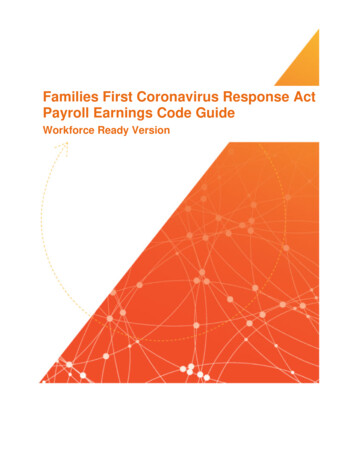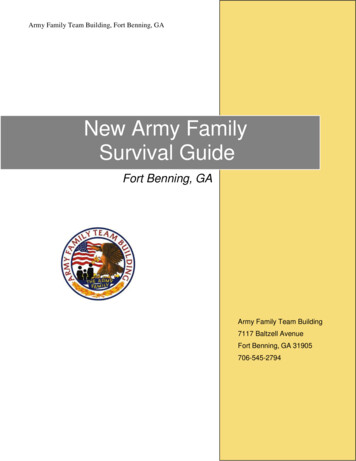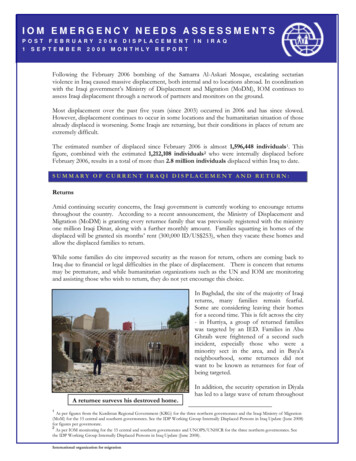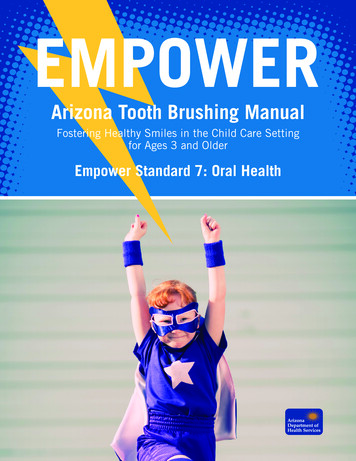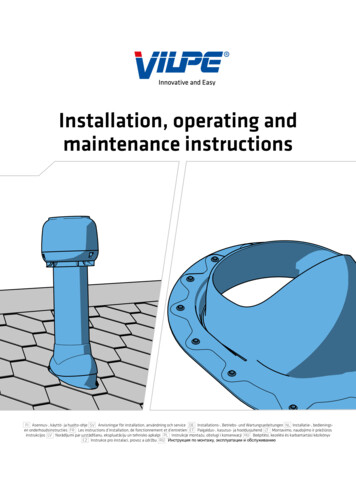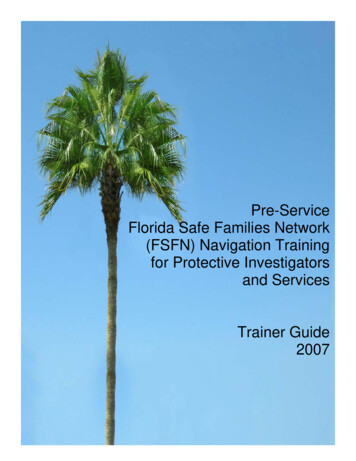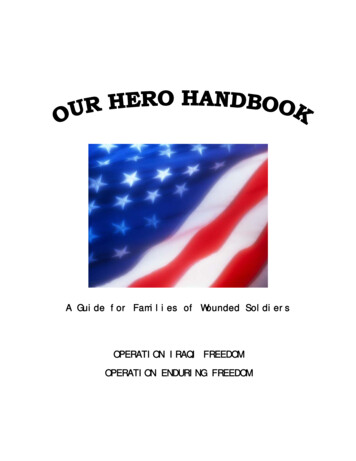
Transcription
A Guide for Families of Wounded SoldiersOPERATION IRAQI FREEDOMOPERATION ENDURING FREEDOM
TABLE OF CONTENTS1. INTRODUCTION / OVERVIEWa. Forewordb. Introductionc. How to use this book2. NOTIFICATION and TRAVEL ORDERSa. Transportation and Travel Orders (T&TOs)b. Travel Preparationsc. Packing Listd. Directions to Hospitale. Settling at Hospital1. Lodging2. Food3. Other Servicesf. Coping with Initial Trauma1. Preparing a child to see injured family members2. Common Reactions/Expectations3. Coping with Stressg. Tips for Dealing with Others and the Mediah. Family and Medical Leave Act3. IN-PATIENTa. Medical Care Team: Role and definitionsb. You as Your Soldier’s Advocatec. Patient Bill of Rightsd. A Soldier’s Viewpointe. War Zone Related Stress- What Families Need to Knowf. Taking care of yourself (not just your soldier)g. Reunion Informationh. Learning to Use the Interneti. Caring Bridge- A way to keep others informed4. OUT-PATIENTa. Why T&TO’s changeb. Non-medical Attendant Ordersc. Medical Hold/Holdover Companyd. Operation Warfighter/ Warrior Outreach Wellness Programe. When You Become Your Spouse’s Caregiverf. When You Become Your Adult Child’s Caregiver
g. Traumatic Injury Protection Insurance (TSGLI)5. MEDICAL EVALUATION PROCESSa. MEB/PEB Overviewb. MEB/PEB Process Question and Answer Formatc. MEB/PEB Process Technical Explanation6. TRANSITIONa. Considerations for the Familyb. Transition Resources7. RESOURCESa. Resources at Walter Reedb. Other Resources8. APPENDIXa. Common Terms and Abbreviations/Acronymsb. Quick phone referencec. Acknowledgements
FORWARDWe serve in the US military that serves a nation at war. Our HeroHandbook is an excellent resource designed to help the family members ofour wounded Soldiers. That very special population includes many familymembers who have little or no prior experience with the US military, andwho need support and guidance as they directly help our wounded Soldiers.This handbook evolved from the experiences of 1LT D.J. Skelton, awounded Soldier who expressed the need for a comprehensive guide toassist families in understanding and navigating the military medical system.Aided by spouses of soldiers from 1LT Skelton’s unit still serving in Iraq,the initial handbook was produced. This year, spouses of the U.S. ArmyWar College Class of 2006, continued the work by updating and enhancingthe contents of this handbook. Those dedicated spouses spent the academicyear collecting and editing information from the field, from Walter Reed,and from agencies responsible for family health and well-being. In doing so,they have demonstrated their capacity for self reliance and the Army’stradition of supporting and helping one another. The U.S. Army WarCollege extends to them its sincere appreciation and gratitude for a job welldone.This handbook offers many ways to deal with the often long road torecovery of our Soldiers - from all services - who will need the loving andinformed support of their families. We are confident that you will find ituseful in your own units as you do the fundamental work of taking care ofour Soldiers and their families.DAVID H. HUNTOON, JRMajor General, U.S. Army
PREFACEEach year at the United States Army War College (USAWC) spouses of studentscomplete a class project done with the ageless spirit of spouses supporting one another.For the past years, they have written or revised handbooks with information regardingmilitary families. In 2006, the tradition of offering help and encouraging self reliancewas accomplished in the opportunity of further developing OUR HERO HANDBOOK,first organized in 2004, at Ft. Lewis, Washington.Inspired by a wounded Soldier, 1LT DJ Skelton, three wives from the 1-25 SBCT,worked with this soldier in compiling information that would be helpful for familymembers of a severely injured soldier, especially family members unfamiliar with themilitary. Led by Lisa McCaffrey, with assistance from Andrea Schaill and Sherri Becker,and encouragement from Sharon Basso, this small group quickly wrote a first handbookthat could be given to parents or a spouse first learning the military medical system aftera serious injury. As a few copies of this handbook ended up at Walter Reed, two othervolunteer military spouses there were trying to organize information helpful for familymembers. Ginny Rodriguez and Carla Bergner took ideas gained from their experience ofspending many hours privately assisting mothers and spouses of injured Soldiers, andbrought their experience and notes to the attention of a spouse at USAWC.Coincidentally, Andrea Schaill arrived at the USAWC in the autumn of 2005, as herspouse was a student in the Class of 2006. LT Skelton resumed his active duty career inthe Washington, D.C. area, and all came together to write a more thorough handbookusing the quick printing resources of the USAWC. Spending many hours at Walter Reedinterviewing medical staff personnel to gain accurate information, Andrea Schaill, andcommittee members Barbara Brinkley, Suzy Hurtado, Jeanette Locke, and Mona Hain,have organized a prototype handbook that can be handed out or read on the internet by afamily member after first learning of a serious injury. This handbook is for those atWalter Reed, and can be used as a model for other military medical centers. It issometimes reassuring to have something physically in one’s hands to refer to, and abooklet to collect information notes, as the long-term process of medical care forrecovery starts.The Family Program office of the USAWC’s Department of Command, Leadership, andManagement, now turn this prototype handbook over to the newly formed MilitarySeverely Injured Center (MSIC) of the Department of Defense for further updates. It is a‘living’ handbook, for it deals with information that will be changing periodically as themilitary medical establishment adapts to the challenges and new conditions that will arisein providing the best medical care for injured Soldiers in the world.It is with gratitude and care for those Soldiers and Families who have made such apersonal sacrifice for the defense of our nation, that the committee dedicates thishandbook.June 2006
How to Use this BookThis handbook is intended for family members of seriously wounded soldiers. Itis not meant to be a complete resource in and of itself, but rather a guide forfamilies to follow when navigating the complex system of care. The handbookdoes not represent itself as “expert” advice as it was written by Army families forArmy families with the support and help of many individuals, agencies, andorganizations who provide our wounded soldiers with an unparalleled level ofcare. Thus throughout this book, reference to the “experts” has been included todirect families to the appropriate resource which can provide “expert” guidance.For those family members who have not had experience dealing with the militarysystem, the use of abbreviations known as acronyms is the norm. Throughout thishandbook, explanations will include the complete name and then the appropriateacronym. At any time, please refer to the acronym section if reading a narrativewhich includes an acronym that is not familiar.It is our hope that families receive this handbook before traveling to the militarytreatment facility. Information is included that may not pertain to those familiesalready at the soldier’s bedside when receiving the handbook. All information isoffered in a general format since every case is unique and may deviate from whatis represented. All wounded soldiers, whether Active, Guard or Reserve arerepresented in this handbook.Regulations, policies, procedures, supporting agencies and legislation regardingwounded soldiers are continuously changing. Continue to seek the most currentinformation from the Department of the Army and the Department of Defense toensure the most complete support for your soldier. If you have received this bookthrough your unit, please make sure it is the most current version by ook/ourherohandbook. This websitealso allows you to send your ideas and suggestions in to improve this book.Keep in mind that throughout this arduous journey from injury to recovery, yourloved one is still a soldier subject to Army rules and regulations. While someArmy rules and regulations may seem foreign to you, they exist to providestructure and protection to both the organization and the people within it.This handbook has been organized into chapters that reflect the chain of eventsthat began with notification of your loved one’s injury. The amount ofinformation may seem overwhelming but taken one step at time, it will provideinformation for each stage of the journey. As with any journey, each person’sexperience will be different. The chapters include some narrative and then willhave articles, resources, and other material pertinent to the stage of the recoveryprocess.
UNIT CONTACT INFORMATIONYour soldier is a part of:Your Unit Contact is:Commercial Phone:Cell Phone:Department of the Army Wounded In Action (DA WIA): 1-888-331-9369It is important for you as a family member to be aware of your soldier’smilitary unit information. This military unit can be useful in supporting youand your soldier during your time at Walter Reed Army Medical Center(WRAMC). Your DA WIA point of contact can provide you with thisinformation. If you have been contacted by the Rear Detachment of yoursoldier’s unit, they can supply you with this information as well.Remember to check at the Unit Liaison office at WRAMC to see if yoursoldier’s unit has a representative there.
SECTION 2Notification and Travel to Hospitala. Notification and Travel and Transportation Orders (T&TOs)b. Travel Preparationsc. Packing Listsd. Directions to the Hospitale. Settling at Hospital1. Lodging2. Food3. Other Servicesf. Coping with Trauma1. Preparing a Child to See Injured Family Member2. Common Reactions/Expectations of Trauma3. Coping with Stressg. Tips for Dealing with Others and the Mediah. Family and Medical Leave Act
NotificationThe process begins for the family with notification. Families are notified of the injury totheir soldier in a number of ways. Some families receive phone calls from their soldierwho then tells them of their injury. Often another military member present may speak tothe family to provide additional information. “Official” notification occurs when eitherthe rear detachment (military member of the soldier’s unit left behind at the home stationto take care of families) or the Department of the Army Wounded in Action Branch (DAWIA) call to notify the family. During “official” notification the family is told the statusof the soldier to include the most recent assessment of the injuries, and is given a phonenumber for the DA WIA to call with questions or update requests. The service memberwho does the “official” notification is not a health care professional and can not offerexplanations of injury or medical terms. The number to DA WIA is 1-888-331-9369. TheDA WIA will initiate phone calls to the family for updates on the movement of thesoldier and changes in medical condition. A “Needs Assessment” checklist is done withinhours of official notification so that the DA WIA is able to coordinate travel quickly forthe family if necessary. It takes an average of 4 to 5 days to move the soldier from thebattlefield to WRAMC, although a longer delay could occur. This means that there willbe time between the notification of the family and actual travel.Travel and Transportation Orders (T&TOs)What are T&TO’s and how do you get them?Family members of wounded soldiers may be invited to travel to the soldier’s bedside atthe Army’s expense if a medical officer determines that it is in the patient’s best interestto have family members present to aid in the recovery process. The physician fills outform DA 2984 requesting the family to travel to the soldier’s bedside. This begins theprocess of obtaining official government travel orders by the DA WIA. If the physician’srequest is approved, the DA WIA will contact the family and may offer up to three familymembers the opportunity to travel to the military treatment facility (MTF) at governmentexpense, in this case, Walter Reed Army Medical Center (WRAMC). Army regulationsdetermine which family members are offered government paid travel. Travel andTransportation Orders (T&TOs) are prepared for the family members and flightreservations are made by the DA WIA. Please note there must be approved travel ordersissued BEFORE departing to WRAMC for the government to pay for the airline tickets,per diem (allowance for food) and lodging. When traveling with T&TOs the DA WIAcoordinates airline travel, passports if necessary, lodging and limousine service from theairport to WRAMC. Each family member’s T&TOs include only one round trip ticketfrom the home of that family member to the medical treatment facility and back to thehome. If traveling by car, the government reimburses the mileage from the familymember’s home to the MTF and back home. T&TOs do not cover mileage incurred whileat WRAMC.
How long do T&TOs last?T&TOs for family members of patients will cover the cost of travel, lodging (see sectionon lodging), and per diem for a pre-determined period of time, usually 30 days althoughin the case of an non-serious injury the time could be 15 days. The dates of coverage arelisted on the orders. It is important to note that the period of time the orders are issuedfor may change. Minor children are put on orders for a period of five days (seesection on children) only. If children stay past the five day period, the cost is theresponsibility of the family.What happens when the orders expire and my soldier is still in the hospital?If the soldier is still an inpatient at the hospital at the end of the orders, the attendingphysician can request an extension which must be approved. If approval is given, anotherset of orders is then issued by DA WIA for a set amount of days, again usually 15 or 30days. This process occurs repeatedly while the soldier is an inpatient at WRAMC. Whilethe soldier is an inpatient, the DA WIA is the issuing authority on the T&TOs. The DAWIA liaison at WRAMC will automatically work the extension for the family and willobtain the new set of orders. ONLY THE ATTENDING PHYSICIAN CAN REQUESTEXTENSIONS. Family members should be aware of the end date on the travel orders andcontact the DA WIA liaison to ensure the extension and new orders have been received.Make sure you get a copy of each set of new orders and keep them in a safe place.Remember that expenses incurred during a lapse in orders will be paid for by you.Can orders be terminated?Orders can be terminated if it is determined that the soldier no longer requires thefamily’s assistance or if the presence of the family is negatively impacting the soldier, thesoldier is discharged from the hospital, or the soldier is transferred to another treatmentfacility. Remember, traveling on orders is a privilege and should not be abused.What happens when my soldier is discharged?T&TOs are terminated when the soldier is discharged from the hospital. At the time ofdischarge, if the soldier needs to receive further treatment as an outpatient and is unableto function independently, a competent medical authority will make a determination if thesoldier needs a non medical attendant (NMA) for assistance with daily living. If anattendant is needed and the request is approved, orders will be issued at WRAMC and arefor one person requested by the soldier. See more on NMA’s in section 4. If thisdetermination is made, then the T&TOs are closed out and the NMA orders issued withno lapse in per diem. Discharge planning begins the day your soldier arrives at WRAMC.The care team assigned to your soldier will keep you informed of any upcoming changein status such as moving to another treatment facility or moving from an in patient to anout patient status.
When the time has come to return home, the Tactical Surgeon’s Liaison Office locatedwithin the Medical Family Assistance Center (MEDFAC) will arrange travel.YOU MUST CLOSE OUT YOUR LAST SET OF TRAVEL ORDERS BEFORELEAVING WRAMC.How does reimbursement occur?Each set of travel orders must be closed out and the travel voucher for reimbursementsubmitted to the Finance Office. There is a liaison from the DA WIA located at thehospital to assist with all questions about T&TO’s and this liaison will assist the familywith the forms necessary to submit travel vouchers as will the Finance Office. TheFinance Office where the travel vouchers must be submitted for reimbursement islocated in Building 11 G81. The hours of operation are 8:30 a.m. to 12:00 p.m and1:00 p.m. to 3:30 p.m. everyday except Wednesday when the office closes at 12:00p.m. You will need your bank account number and the bank routing number forreimbursement of the T&TO’s which is done by direct deposit. This information isusually found on a check. Bring your receipt for lodging if staying at a local hotel. Thereceipt must show a zero balance.How often do I receive reimbursement?Each set of travel orders will be reimbursed. For example if the first set of orders is fromJune 1 to June 30, on July 1st you submit your voucher for reimbursement. If the next setof orders is for July 1 to July 30, then on July 31st you submit another voucher forreimbursement. One reimbursement payment is made per month. This cycle willeventually end and YOU MUST CLOSE OUT YOUR LAST SET OF TRAVELORDERS BEFORE LEAVING WRAMC.How much will I be reimbursed?The current reimbursement rate is 61 per day (per diem) plus the cost of lodging up tothe allowable government nightly rate. For family members staying at the MologneHouse on T&TO’s, the cost of lodging is billed directly to the government. There is noreimbursement for telephone calls (see MEDFAC and Red Cross for phone cards), taxi’sin and around the area, rental cars, or mileage in and around the area.Can I get a cash travel advance to support my travel?Advances or travel advances are allowed on the first set of travel orders. Once you arriveat WRAMC, tell the DA WIA liaison that an advance is needed. You will be directed tothe Finance office. You will need a copy of your orders and a picture ID. Advances aregiven in cash and repaid either by being deducted from the travel voucher reimbursementat the end of the travel orders or taken from your bank account if the advance is greater
than the amount to be reimbursed. Before getting an advance, make sure your soldier isgoing to remain at WRAMC for that period of time you are receiving the advance. Theadvance should be budgeted for the length of the orders. For example, you can request a15 day advance against a set of 30 day travel orders. The amount received will need tolast until the end of the 30 day period and for the amount of time it takes to receivereimbursement once the voucher is filed.What if I need to make a trip home to take care of business, will I lose my T&TOs?You may return to your home for a period of up to 7 to 10 days to take care of businesswithout losing your travel orders. You will not receive the 61 per diem for the days youare at home nor will the government pay for your travel home. Go to the Casualty AffairsOffice located on the 2nd floor at WRAMC and they will assist you with a form grantingyou permission to leave and retain orders. Get a copy of that form when signed. Checkwith the MEDFAC before booking your flight to see if you qualify for Hero Miles, aprogram that offers free airline travel. You will have to check out of your local hotel ifyou are being reimbursed for the room, then check back in when returning for your triphome.The bottom lineTravel orders may be issued if a physician determines that it is in the best interest of thesoldier to have family present during the recovery process. You must be patient as it takesan average of 4 to 5 days to get a soldier from the battlefield to WRAMC. An additionalcouple of days delay may occur if the soldier arrives at WRAMC on the weekend or on aholiday. Forms will be filled out, approvals obtained, and orders issued through anofficial process that ensures families will be taken care of during their journey. Use yourDA WIA phone number to verify all travel information.
Summary for Government Sponsored TravelNotification OccursDA WIA Needs Assessment Checklist CompleteDA Form 2984 Completed by PhysicianApproval for family travel grantedTravel and Transportation Orders (T&TOs) Issued Roundtrip airline ticket or approved auto travel round trip mileage Per Diem (daily allowance for meals) 61/day Lodging up to allowable government nightly rate Issuing authority Department of the Army Wounded In Action (DA WIA) 1-888331-9369 WRAMC DA WIA Liaison (202) 782-3735 (located within hospital) Advances allowed with Department of the Army (DA) approval 5 day orders only for minor children Issued for specified time periods; normally 30 day increments for seriouslywounded Extension requests through physician and if approved, DA WIA (see liaison) At end of each set of orders, travel voucher submitted for reimbursement Copies of all receipts and orders kept by familyDA WIA Contacts family and begins travel coordinationLimousine/van picks family up at airport or family takes taxi/shuttleFamily arrives at WRAMC
I was not offered travel by the DA WIA and have decided to go to WRAMC, whatcan I do?If you travel without T&TO’s you are responsible for your own lodging, food, andtransportation. When T&TO’s are not authorized, there are other avenues of receivingfree airline tickets to visit your soldier. The nonprofit Fisher House Foundation hasteamed up with "Operation Hero Miles" to provide eligible soldiers undergoing treatmentat a military medical center incident to their service in Iraq, Afghanistan, or thesurrounding areas with a complimentary, round-trip airline ticket. The tickets areavailable to eligible family and friends as well. Please note that the Hero Miles are notsubject to the same regulations on who may travel as the T&TO’s. The request form isavailable for pick up at the Medical Family Assistance Center (MEDFAC). The requestmust come from the patient. Ticket eligibility is determined by the Fisher HouseFoundation. There are multiple ticket restrictions to include a 14 day advance purchase.In addition, if you are going to try to use “Operation Hero Miles”, get approval throughthe Fisher House Foundation first, don’t pay for the tickets using your credit card. TheFoundation will provide you with the information on how to make reservations.If you are a military family member with an ID card, check the Washington D.C. area forall nearby military installations that might have lodging. The Mologne House atWRAMC is obviously a first choice, be aware that families traveling on T&TO’s willhave priority as well as wounded soldiers on out-patient status. Make contact with theWRAMC Medical Family Assistance Center (MEDFAC) at 1-866-546-1310 forinformation about availability of lodging and suggestions for local hotels and make use ofyour own sources for discounts such as motor clubs, retirement associations, non-profits,etc. Utilize every resource that you can to avoid incurring a financial burden at an alreadystressful time.Once you are at WRAMC, immediately check in with the MEDFAC so that they canassist you. There are resources available for all families, not just those who travel onorders. The Red Cross is located directly across from the MEDFAC, and they too canoffer assistance and have access to various resources. Army Community Service has awelcome packet that can orient you to the area. Every Monday morning there is ameeting for families at the Mologne House that includes representatives fromorganizations that support families and soldiers during their stay at WRAMC.If you choose to travel on your own, without orders from DA WIA, then understand thatyou will not have the same privileges as those who have traveled under orders. Themilitary operates under laws and regulations and organizations associated with themilitary are bound to follow those laws and regulations.
FISHER HOUSE FOUNDATION AND HERO MILESFisher House Foundation is best known for the network of 32 comfort homes on thegrounds of military and VA major medical centers. The houses are 5,000 to 8,000 squarefoot homes, with up to 11 suites, donated to the military and VA by the Fisher family ofNew York through the Fisher House Foundation. The Foundation provides support tofamilies of patients receiving care at the nearby medical center and has ensured thatfamilies of service men and women wounded or injured in Operation Iraqi Freedom andOperation Enduring Freedom do not pay for their stay at a Fisher House or other basefacility if they are on a wait list.Hero Miles ProgramThis program has provided more than 4,600 tickets to Iraqi Freedom and EnduringFreedom hospitalized service members and their families, worth more than 6 million.Fisher House is proud to partner with Hero Miles in support of our wounded andinjured service men and women and their families. Hero Miles has partnerships with thefollowing airlines: AirTran AirwaysAlaska AirlinesAmerica West AirlinesAmerican AirlinesContinental AirlinesDelta Air LinesMidwest AirlinesNorthwest AirlinesUS AirwaysPlease note program agreements with individual airlines only permit airline tickets formilitary (or DoD civilian employees) hospitalized as a result of their service in Iraq,Afghanistan, or surrounding areas, and their families. These tickets can not be used forR&R travel, ordinary leave, emergency leave, or other travel not related to a medicalcondition.
FISHER HOUSE FOUNDATION, INC."Dedicated to our greatest national treasure.our military service men and women and their loved ones. "Dear Service Member,On behalf of Fisher House Foundation, thank you for your service to our nation. You are truly one of America'sheroes.If you are undergoing treatment at a military medical center incident to your service in Iraq. Afghanistan. or thesurrounding areas, you and your family members may be eligible for complimentary airline tickets that have beendonated to our Foundation. We would be honored to provide these tickets to you and your loved ones under thefollowing conditions:¾For you: We are prepared to provide you with a round trip airline ticket for a trip from the medicalcenter to your home and return if you are not eligible for government funded airfare.¾For your family and friends: In medically serious cases, the government provides a transportationentitlement for up to two family members for travel to the medical center where you are hospitalized. Ifyou do not qualify for that government funded travel, we may be able to provide your family or a friendwith round trip airline tickets to visit you. Please bear in mind that we are providing only airline tickets.There are no provisions for assistance with local travel, overnight accommodations, meals or otherexpenses. As long as Fisher House Foundation has tickets available, there is no restriction on thenumber you can request or how often you request them.The tickets that we have for this purpose are on American Airlines and Northwest Airlines. The American Airlinestickets were donated by Anheuser-Busch, and the Northwest Airlines tickets are from WorldPerks frequent flyermiles donated by the public through the Northwest Airlines AirCares program. The attached information sheetscontain the terms and conditions for their use. It is important that you understand that you must comply with all termsand conditions, to include payment of the September 11th security fee (normally not to exceed 10 per round trip).Reservation and ticket agents are not authorized to make exceptions to the stated terms and conditions.Because the Northwest Airlines ticket program depends on the generosity of the public, we encourage you to tellyour family and friends who are WorldPerks members to donate Northwest Airlines frequent flyer miles for thisprogram. To make a donation, call (800) 327-2881.For travel to the Washington, D. C. area, we are pleased to provide complimentary ground transportation to and fromone of the three area airports to the major medical centers, through the generosity of the Georgetown Wounded PatriotSupport Project. Information about this program will be provided when the tickets are issued.If you or your loved ones can meet all the criteria, please complete the attached request form and submit it to thefamily assistance center or other designated office that will forward the request to us. Incomplete forms will not beaccepted.Thank you. These tickets are an expression of our appreciation for your service and sacrifice.** Above letter from the Fisher House Foundation
Travel Preparation ConsiderationsDocuments: Copies of your T&TOs (keep one with you at all times) Military ID or government issued ID such as Driver’s License Power of Attorney (If your soldier left you one) Living Will (If your soldier has one, many do not) Immunization records for children in need of day care (This is a must!) Name and phone number of Point of Contact for the soldier’s unit (The DA WIAwill be able to tell you what the unit is if you do not know) Valid Passport if overseas travel is involved Original prescription for any medications that you may need Health insurance information for traveling family members* This HandbookTravel Money: Major Credit Card (maintain copy of front and back of card in case of loss) Cash or Traveler’s Checks Checkbook and/or account number and bank routing number*** For military dependents: If staying out of the TRICARE region for longer than30 days, consider changing your TRICARE area** If staying at WRAMC for extended period of time, consider opening an accountat a bank there to avoid ATM charge
Our Hero Handbook is an excellent resource designed to help the family members of our wounded So



